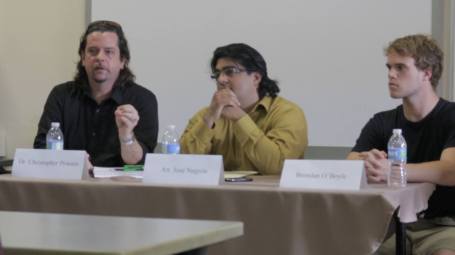By: Alejandro Silva Malines
Race. Police brutality. Ferguson. Racial profiling. On October 14, students from the University of Puerto Rico-Mayagüez assembled a conference about racial profiling. The panel, composed of literature professor Christopher Powers, licensed attorney José Negrón and UPRM student Brendan O’Boyle, talked about the essence of this social problem.
Professor Powers, professor of comparative literature from the Humanities Department of the UPRM, started the discussion in the conference. Professor Powers said that racial profiling exists because some look at it “as a legitimate tool to perform effective policing.” When talking about racial profiling, the one thing that pops into mind are police officers.
Powers also mentioned various points regarding the very nature and origin of “race”, which lead to the transportation of slaves during the age of conquest. “Race is an invention,” said Powers.
Students asked whether this practice was present in here in Puerto Rico. “Racial profiling is everywhere,” said attorney Negrón. He specified that cases like that are most likely found in San Juan, due to the large Dominican community.

Professor Powers explaining how “race” itself is an invention and a way of profiling (Photograph by Pedro Silva Malines)
Attorney Negrón added that, “the problem with racial profiling is not where it’s illegal, it’s where it’s legal.” The legalization of such practice, much like Arizona’s Support Our Law Enforcement and Safe Neighborhoods Act or SB 1070 anti immigration law, made citizens argue and protest about their civil rights. The SB 1070 was highly criticized, as stated by the American Civil Liberties Union or ACLU, “[it] invite[s] rampant racial profiling against Latinos, Asian-Americans and others presumed to be ‘foreign’ based on how they look or sound.” Granting authorities this power could cause the uncalled persecution and othering of ethnic groups, which could lead to greater problems among the communities and much distrust toward the officials.
Racial profiling can happen anywhere and to anyone as Brendan O’Boyle, the third panelist, mentioned. Mr. O’Boyle, a UPRM student from Michigan, talked about how people have had judgments about him just because of how he looks. Although, he has been a victim and witness of racial profiling, he maintains an optimistic approach. “Our role [as students] is to take what we’ve learned through our education and help to educate others,” said Mr. O’Boyle.
A recurring topic in the conference was the highly watched case of Michael Brown in Ferguson, Missouri. Michael Brown was an African-American youth who was shot and killed on August 9. Professor Powers stated, “by what standard of sane and reasonable police measures can that be justified?”, regarding the quantity of shots that Brown received. Brown was shot six times and allegedly some of the shots were received while his arms were up. Powers later added, “It can be justified because black lives mean less. Latino lives mean less.”
Arguments about proper policing arose in the discussion. Attorney Negrón mentioned that police departments are not “policing their own,” while professor Powers added that this technique of racial profiling will not be present as long as there is power. Mr. O’Boyle mentioned that the only way to get rid of stereotypes and racism is through the education.
To move in this direction and because of the quantity of police brutality cases, an organization called Resolution Group International (RGI) in Spring Lake, New Jersey, is providing ethical training and education to police officers, military and security personnel. RGI provided “over the course of three days, the men and women … verbal communication skills, physical self confidence and ethical clarity.”
More racial profiling and police brutality cases are being reported because of technological advances. Countless acts are being published as presented in the webpage titled PoliceMisconduct.net. Although many of the cases reported are not race related, there are still some that are. Despite the fact that cases like Trayvon Martin’s in February 2012 and Michael Brown’s in August of this year have awoken the population’s attention, this problem seems to be increasing.
Leave a comment